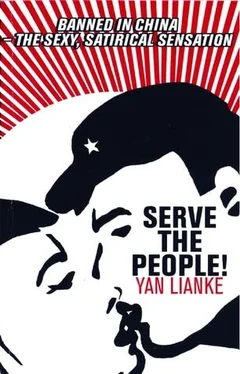His mission complete, the tall, thin officer returned to his office, leaving Wu Dawang standing alone in the large waiting room. And it was from this point on, in fact, that he was engulfed by a sense of solitude that descended on him as abruptly as, two months earlier, love had.
For the sake of appearances, Liu Lian didn't go with him to the station. In fact, she didn't even make it as far as the gate to Compound Number One, where the) eep that Management had sent was waiting for him. As they were about to say good-bye, the jeep sounded its horn. `Take this,' she said, stuffing twenty crisp ten-yzuzzz notes into his hand, `and buy your wife some decent clothes, and your son some toys and treats.' He shook his head but she insisted, slipping the money into the leather briefcase she'd found for his travel documents.
The jeep honked its horn another couple of times.
As the tears rolled down his cheeks, she offered him a slight, gloomy smile. `Liu Lian,' he said, taking her hand, `will I ever see you again?'
After allowing him to clasp it for a minute, she withdrew her hand again. `Off you go, the driver's waiting.' He had no choice but to turn and leave.
Though he'd hoped she would see him all the way to the jeep, he told her not to, and nor did she. As he drove away from the compound, however, he saw her emerge from the house. She stopped under the vine trellis and waved at the vehicle as it sped off, a brave, sad smile on her face.
He didn't know that the image of this last smile would dominate his memories of her for the rest of his life. And, during the painfully slow, lonely six weeks' leave that he endured in the Balou Mountains, that same smile was his main source of consolation.
Nor did he know that, during those same six weeks, the illustrious Division he had served in for the last five years was preparing — under pressure from invisible forces within to vanish from the state military system. He didn't understand, either, how devastating the demobilization would be for so many people, or how many destinies his affair with Liu Lian was-directly or indirectly- to change. While it would be an exaggeration to claim that their liaison alone had destroyed an entire Division, without it fate would have dealt a very different hand to his comrades-in-arms. Little did Wu Dawang know-as he fretted away his leave-that his Division Commanders were conducting an elaborately premeditated, officially authorized operation to obliterate from view the Sergeant of the Catering Squad and his personal history.
Amnesia would become the Division's new watchword.
While the Division as it set about its disappearing act-concentrated on forgetting him, Wu Dawang thought obsessively about the barracks, just as the life of a dying man flashes before his eyes, and grew easily impatient with the tedious pace of village life. And every night, once dusk had fallen, he found himself unable to resume normal marital relations with his wife.
Zhao Ezi was still his wife. Admittedly, she'd only ever demonstrated a kind of dull ineptitude in matters conjugal-an ability to speak out on inappropriate subjects at inappropriate moments that had utterly alienated the two of them from each other. Her emotional idiocy had from the outset blighted their attempts at intimacy. But nevertheless, ever since he had promised her a home in the city, she had resolved to engage diligently in nocturnal manoeuvres with him. Though she continued to be embarrassed by sex and would never make any unsolicited declaration of love, or ask him to give her physical pleasure, she would for the most part passively fall in with his own urges and allow him free run of her whenever the mood took him. Since becoming a Sergeant and a Party member especially, he had only to tell her about his latest commendation, about the step closer toward officialdom it had brought him, and she would smile dutifully and let him proceed as he pleased, turning herself into a reward for successes so far achieved, a motivation to carry him through the struggles that remained.
In the few years that they had been married, she and Wu Dawang had spent no more than two or three months actually living together-not much more than he'd spent with Liu Lian. But, in every other way, these two periods of time were as different as Heaven and earth. While his wife viewed sex as a prize for good behaviour, as the regrettable but necessary release of a primal instinct, Liu Lian saw it as an equal, creative exchange of pleasure.
Now, however, the happiness he had shared with Liu Lian lay entirely in the past. It existed only as a memory.
Probably because he was so busy remembering, for weeks following his return from the army, Wu Dawang did not make the slightest move in the direction of his wife. She was still the same simple, unaffected woman she had always been. Though she was nothing to look at compared to Liu Lian, though she lacked her sophistication, she did have certain qualities her rival lacked-youth being one. And as for the idea of sending him off to work in the kitchen-in her eyes, for him to cook her a meal would be an unthinkable humiliation. And she would never have let him wash dishes or clothes. If the neighbours saw him doing anything of that kind, they would think her positively debauched.
But working the land was his responsibility alone, and in this-taking in the corn, binding up the sheaves, ploughing, sowing the wheat, hauling dung, spreading fertilizer and so on-he was never less than diligent. But while farming kept him busy during the days, the nights offered no distraction.
The village of Wujiagou was made up of some twenty holdings dotted across a flank of the Balou Mountains, its hundred-odd inhabitants living off a combination of collective and private farming. On the wasted edges of a collectively owned field, for example, a villager might plant a few beans or sesame for his own family, or he might requisition a sandy bend of a river in which to sow cabbages and radishes. This was done not in the expectation that they would all grow to maturity and yield a full harvest, merely in the hope that whatever survived would help the family to scrape together their three daily meals. Every day Wu Dawang worked away in the fields, recounting to his fellow villagers what he had seen of the outside world. Every evening he would stay up long after his wife and son had gone to bed. Sitting in the courtyard by the house, or out on a nearby hillside, he would stare silently off in the direction in which his barracks lay, as if he were drunk, or deranged.
Perhaps a month after his return, in the middle of one of these nights, his wife nudged him with her elbow as he lay sleeping in bed. `What's wrong?' she asked.
He pretended not to understand. 'What do you mean?'
`Is it because you haven't won any new commendations for the past six months? Is that why you won't touch me? You can have me if you want, as long as you keep working hard when you get back.'
This offer of sex on credit was the first encouragement she had given him, the first time she had intimated any form of physical desire. But he saw immediately that, as before, she continued to bind sex inextricably together with promotion — that she saw his desire for intimacy as a means for bettering her material situation, no different in essence from the hoe or pickax he used to turn the earth. As all this came back to him, his affection for her-such as it had been-withered into insignificance.
He refused either to touch her, or offer her reassurance. 'I swore an oath that if I failed to become an official, I'd never come near you again,' he told her almost primly as he sat up in bed. `But I never thought it would take this long.' Hiding behind this pretext of bad conscience, he got out of bed and stood in the courtyard for a while, gazing up at the night sky. Somehow, the full moon brought forth such a frenzy of impossible, presumptuous thoughts about Liu Lian that, to calm himself, he walked off into the night, up a hill beyond the village. And there he stayed until dawn, when his wife appeared, calling out his name.
Читать дальше












